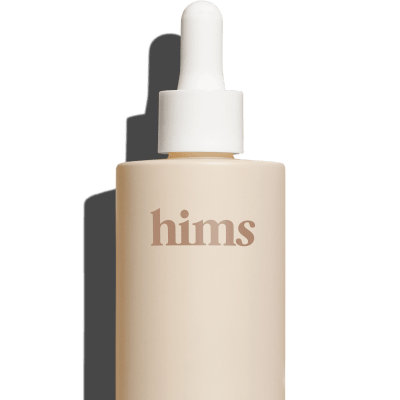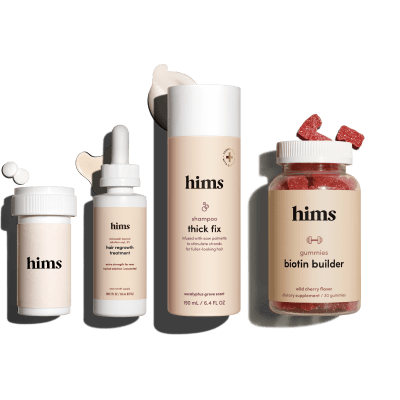Content
FDA approved for more than 25 years
6 Best Shampoo Types for Men Losing Hair

If you’ve noticed your hair thinning or a bald spot growing in size, your first action is probably to immediately look up which hair products can prevent you from going completely bald. While some guys prefer to rock the bald look, others may want to stop hair loss in its tracks.
Hair loss or thinning hair can be caused by a combination of genetics, health factors and lifestyle habits. Still, certain active ingredients can help strengthen and improve overall hair health.
But thousands of products claim to eliminate hair loss, regrow lost hair and make your hair look better than ever. So, which men’s hair loss shampoo should you try?
We rounded up the best shampoo for men losing hair and other hair loss treatments to consider.
Content
What Causes Hair Loss?
To know the best shampoo for balding men, it helps to understand the causes of hair loss. Don’t worry — we’ll keep this brief. You can find out which shampoo or conditioner to buy further down in this guide.
Men with thinning hair are most likely struggling with a common type of hair loss, a condition called androgenetic alopecia or male pattern baldness.
This cause of hair loss can be linked to dihydrotestosterone — you can just call it DHT — an androgen hormone your body produces as a byproduct of testosterone.
Testosterone is converted to DHT by an enzyme called 5-alpha reductase in your scalp, including in your hair follicles. DHT can damage hair follicles and cause hair to gradually become thinner by miniaturizing (essentially shrinking) the hair follicles. Crazy stuff, we know.
Of course, there are other causes of hair loss or hair thinning to be aware of. Certain medical conditions, medications, lifestyle choices and aging can all cause hair to fall out.
All about hair, here
Now that you know a bit about how hair loss happens, we’re here to save you the trouble of opening several tabs on your computer and searching “best shampoo for hair loss men.”
What qualifies as “best” will vary from guy to guy. But in many cases, the right products and ingredients can help support hair regrowth.
Most active ingredients in hair loss shampoos can be sorted into two categories: DHT blockers and ingredients that stimulate hair growth.
DHT blockers are exactly what they sound like — ingredients that block the hormone dihydrotestosterone responsible for male pattern baldness.
Meanwhile, ingredients that stimulate hair growth encourage new hairs either by accelerating the hair growth cycle or increasing blood flow to the scalp.
The sooner you switch to the best shampoos for thinning hair with these key ingredients, the faster you’ll see thicker hair.
Ketoconazole Shampoo
Although it’s an active ingredient in anti-dandruff shampoos, ketoconazole is also one of the most common active ingredients in hair loss shampoos.
With the ability to control fungal growth and treat skin infections such as tinea capitis, ketoconazole is widely used in shampoos and medications as a means of controlling dandruff, skin rashes and hair loss.
In a small pilot study, patients experiencing hair loss saw improved hair growth using a product containing ketoconazole. Anecdotal reports have also suggested that higher doses of ketoconazole shampoos help with hair loss.
However, the product used in the study also contained several other ingredients, including common hair loss medications.
While limited studies are available on ketoconazole’s effects on hair, some research suggests it could disrupt the DHT pathway — the process by which testosterone is converted into DHT.
For example, research published in 2004 concluded that ketoconazole could disrupt DHT activity in the scalp, making it a potentially useful adjunct to treatment with finasteride.
Our guide to ketoconazole and hair loss goes into more detail about its benefits for thinning and fine hair, as well as the latest research on its efficacy as a hair loss treatment.
We should note that ketoconazole can be overly drying on strands. With that in mind, it should be avoided by people with certain hair types, like curly or color-treated hair. At the very least, use a hydrating conditioner after lathering up.
Salicylic Acid Shampoo
Salicylic acid is a popular active ingredient in acne treatments, but it’s also known for its effects on hair loss.
As an exfoliant, salicylic acid is used to wash away excess sebum — the oil-like substance secreted by the sebaceous glands in your scalp — for a healthy scalp.
But beyond scalp health, you might wonder if salicylic acid shampoo helps hair loss.
Premature hair loss may be caused by scalp conditions like dandruff and seborrheic dermatitis, as they can limit the production of healthy hair.
Interestingly, several studies have found a connection between acne and higher testosterone production, including higher levels of DHT.
Though salicylic acid doesn’t affect the pathway of DHT like ketoconazole, it may help to reduce hair loss by getting rid of sebum buildup. Consider our Dandruff Detox shampoo, which contains salicylic acid and pyrithione zinc, another ingredient for thin hair or balding men.
Saw Palmetto Shampoo
Saw palmetto is a natural extract of the saw palmetto fruit — a subtropical fruit that grows in the Southeastern United States.
Research on whether saw palmetto works to treat hair loss and thinning hair is limited but promising.
One study suggests that saw palmetto may help block the activity of 5-alpha reductase — as noted, this is the enzyme that converts testosterone into DHT.
Saw palmetto might also reduce the uptake of DHT in your hair follicles, which decreases DHT’s ability to bind to specific hormone receptors.
One review of seven studies found that oral and topical supplements containing saw palmetto improved hair quality by 60 percent, increased hair density by 83 percent and raised total hair count by 27 percent in people with hair loss.
You may end up with hair you can run your hands through (without strands falling out, of course) with the use of our thickening shampoo with saw palmetto in addition to other hair loss treatments.
Want to know more about this extract’s ability to target reduced hair volume? Our guide to saw palmetto for hair loss goes into detail about its potential benefits for your hair’s health and thickness.
Biotin Shampoo
Biotin (vitamin B7) is a coenzyme that plays a key role in helping you grow thick, healthy and strong hair.
While biotin doesn’t prevent hair loss, research suggests it may have a significant effect on the speed at which you can grow new hair when using other hair loss treatments (which we’ll talk about in a bit).
It’s worth pointing out that biotin is a water-soluble vitamin (meaning you pee most of it out), and there’s currently no scientific evidence that the body can absorb it through the scalp. As such, you’ll likely get more hair-fortifying results from a biotin supplement than you would from a shampoo containing the B vitamin.
Our biotin gummy vitamins provide a convenient daily dose of biotin, as well as other vitamins and nutrients for healthy hair, nails, skin and digestion.
Will you join thousands of happy customers?
4.5 average rating
Pumpkin Seed Oil Shampoo
If you’re interested in natural ingredients for men’s hair loss shampoo, look to pumpkin seed oil.
In one study, researchers found that men with male pattern baldness who used a pumpkin seed oil supplement showed a 40 percent improvement in hair growth after 24 weeks — compared to just 10 percent of those who used a placebo.
This plant seed oil is also rich in nutrients such as zinc and manganese, as well as antioxidants like vitamin E, amino acids and linoleic acid — all of which may contribute to healthy hair.
As with saw palmetto and biotin, it’s crucial to note that most scientific research into the effects of pumpkin seed oil focuses on oral consumption, not topical use in the form of shampoo.
Shampoo With Natural Oils
Like pumpkin seed oil, natural oils — like rosemary, peppermint and jojoba — are common nourishing ingredients in hair loss shampoos. Many are also easy to find as essential oils, making them a simple addition to any shampoo formula if you’re aiming to fight hair loss from every angle.
One study found that a mixture of natural oils (which included rosemary oil, lavender oil and several others) was effective at treating a form of hair loss called alopecia areata.
Meanwhile, another study found that lavender oil applied topically to mice once a day for four weeks increased the number of hair follicles.
Peppermint oil may also increase hair count as well as hair thickness, according to successful studies performed on mice.
But while these studies are certainly promising, we have to put them into perspective. Right now, there’s only a small amount of research on natural oils, so it’s hard to draw a firm conclusion on whether they’re effective.
At the very least, adding rosemary, lavender or peppermint oil to your shampoo can make your hair smell great and may be good for damaged hair.
Before buying the best shampoo for men’s hair loss, double-check the label.
When it comes to shampoos and other hair products, ingredients almost always make more of an impact than brand names — plus, many have other additives that may or may not be beneficial.
So before reaching for that bottle of Nioxin®, look at the ingredients list to see if anything in there can actually stop shedding, stimulate growth or improve scalp health.
Should you avoid sulfates in shampoo? More importantly, which ingredients in shampoos cause hair loss?
Certain sulfates, such as sodium lauryl sulfate and sodium laureth sulfate, have been associated with transepidermal water loss (moisture loss in your outermost layer of skin) in research. This can cause breakage, more hair fallout or just dry hair.
When looking for hair products that won’t worsen hair loss, sulfate-free formulas are ideal. In case you need more options, this guide provides insights into shampoos that don’t cause hair loss.
The best men’s shampoo for hair growth will only go so far in stopping hair loss or hair thinning. Pairing these shampoos with other hair loss treatments may increase hair growth.
Currently, the two most effective FDA-approved medications for treating and preventing hair loss are minoxidil and finasteride.
Minoxidil is a topical medication that comes as a liquid solution or topical foam. It works by increasing blood flow to your scalp and moving hairs into the anagen (growth) phase of the hair growth cycle.
Finasteride works by stopping your body from creating DHT. If you’d like to use minoxidil and finasteride together, you can combine them with our topical finasteride & minoxidil spray.
If you’re looking for haircare products that’ll specifically give you a fuller head of hair, these are some of the best shampoos for thinning hair in men. We also offer a volumizing shampoo and volumizing conditioner for a fuller-looking mop.
For those facing baldness, here’s a rundown of DHT-blocking shampoos.
Hair loss treatments, delivered
Dealing with hair loss can be a stressful experience, especially if it worsens quickly and makes certain hairstyles off-limits. But can shampoos or cleansers actually help hair loss?
Hair loss or male pattern baldness is caused by testosterone being converted into the hormone dihydrotestosterone (DHT) that shrinks hair follicles and slows down growth.
When it comes to hair loss shampoos, it’s better to look for active ingredients like saw palmetto, ketoconazole, salicylic acid and biotin than particular brand names.
Although these ingredients can be effective, combining them with medications like minoxidil or finasteride can improve hair growth even more.
There’s not really one best shampoo for men losing hair. But you can combine certain ingredients and hair loss treatments to get the best results for your unique needs.
If you’re interested in exploring more options for hair growth, Hims offers a wide range of hair loss treatments.
16 Sources
- Hair loss: Who gets and causes. (n.d.). American Academy of Dermatology. Retrieved from https://www.aad.org/public/diseases/hair-loss/causes/18-causes
- Rafi, A. W., & Katz, R. M. (2011). Pilot Study of 15 Patients Receiving a New Treatment Regimen for Androgenic Alopecia: The Effects of Atopy on AGA. ISRN dermatology, 2011, 241953. Retrieved from https://www.ncbi.nlm.nih.gov/pmc/articles/PMC3262531/
- Hugo Perez, B. (2004). Ketocazole as an adjunct to finasteride in the treatment of androgenetic alopecia in men. Medical Hypotheses, 62(1), 112-115. Retrieved from https://www.sciencedirect.com/science/article/abs/pii/S0306987703002640?via%3Dihub
- National Center for Biotechnology Information (2023). PubChem Compound Summary for CID 338, Salicylic Acid. Retrieved from https://pubchem.ncbi.nlm.nih.gov/compound/Salicylic-Acid.
- Trüeb, R. M., Henry, J. P., Davis, M. G., & Schwartz, J. R. (2018). Scalp Condition Impacts Hair Growth and Retention via Oxidative Stress. International journal of trichology, 10(6), 262–270. Retrieved from https://www.ncbi.nlm.nih.gov/pmc/articles/PMC6369642/
- Makrantonaki, E., Ganceviciene, R., & Zouboulis, C. (2011). An update on the role of the sebaceous gland in the pathogenesis of acne. Dermato-endocrinology, 3(1), 41–49. Retrieved from https://www.ncbi.nlm.nih.gov/pmc/articles/PMC3051853/
- Evron, E., Juhasz, M., Babadjouni, A., & Mesinkovska, N. A. (2020). Natural Hair Supplement: Friend or Foe? Saw Palmetto, a Systematic Review in Alopecia. Skin appendage disorders, 6(6), 329–337. Retrieved from https://www.ncbi.nlm.nih.gov/pmc/articles/PMC7706486/
- Pais, P., Villar, A., & Rull, S. (2016). Determination of the potency of a novel saw palmetto supercritical CO2 extract (SPSE) for 5α-reductase isoform II inhibition using a cell-free in vitro test system. Research and reports in urology, 8, 41–49. Retrieved from https://www.ncbi.nlm.nih.gov/pmc/articles/PMC4847595/
- Patel, D. P., Swink, S. M., & Castelo-Soccio, L. (2017). A Review of the Use of Biotin for Hair Loss. Skin appendage disorders, 3(3), 166–169. Retrieved from https://www.ncbi.nlm.nih.gov/pmc/articles/PMC5582478/
- Cho, Y. H., Lee, S. Y., Jeong, D. W., Choi, E. J., Kim, Y. J., Lee, J. G., Yi, Y. H., & Cha, H. S. (2014). Effect of pumpkin seed oil on hair growth in men with androgenetic alopecia: a randomized, double-blind, placebo-controlled trial. Evidence-based complementary and alternative medicine : eCAM, 2014, 549721. Retrieved from https://www.ncbi.nlm.nih.gov/pmc/articles/PMC4017725/
- Batool, M., Ranjha, M. M. A. N., Roobab, U., Manzoor, M. F., Farooq, U., Nadeem, H. R., Nadeem, M., Kanwal, R., AbdElgawad, H., Al Jaouni, S. K., Selim, S., & Ibrahim, S. A. (2022). Nutritional Value, Phytochemical Potential, and Therapeutic Benefits of Pumpkin (Cucurbita sp.). Plants (Basel, Switzerland), 11(11), 1394. Retrieved from https://www.ncbi.nlm.nih.gov/pmc/articles/PMC9182978/
- Hay, I. C., Jamieson, M., & Ormerod, A. D. (1998). Randomized trial of aromatherapy. Successful treatment for alopecia areata. Archives of dermatology, 134(11), 1349–1352. Retrieved from https://jamanetwork.com/journals/jamadermatology/fullarticle/189618
- Lee, B. H., Lee, J. S., & Kim, Y. C. (2016). Hair Growth-Promoting Effects of Lavender Oil in C57BL/6 Mice. Toxicological research, 32(2), 103–108. Retrieved from https://www.ncbi.nlm.nih.gov/pmc/articles/PMC4843973/
- Oh, J. Y., Park, M. A., & Kim, Y. C. (2014). Peppermint Oil Promotes Hair Growth without Toxic Signs. Toxicological research, 30(4), 297–304. Retrieved from https://www.ncbi.nlm.nih.gov/pmc/articles/PMC4289931/
- Bondi, C. A., Marks, J. L., Wroblewski, L. B., Raatikainen, H. S., Lenox, S. R., & Gebhardt, K. E. (2015). Human and Environmental Toxicity of Sodium Lauryl Sulfate (SLS): Evidence for Safe Use in Household Cleaning Products. Environmental health insights, 9, 27–32. Retrieved from https://www.ncbi.nlm.nih.gov/pmc/articles/PMC4651417/
- Patel, P., Nessel, T.A., Kumar, D. D. Minoxidil. [Updated 2023 Nov 15]. In: StatPearls [Internet]. Treasure Island (FL): StatPearls Publishing; 2023 Jan-. Retrieved from https://www.ncbi.nlm.nih.gov/books/NBK482378/
Editorial Standards
Hims & Hers has strict sourcing guidelines to ensure our content is accurate and current. We rely on peer-reviewed studies, academic research institutions, and medical associations. We strive to use primary sources and refrain from using tertiary references. See a mistake? Let us know at blog@forhims.com!
This article is for informational purposes only and does not constitute medical advice. The information contained herein is not a substitute for and should never be relied upon for professional medical advice. Always talk to your doctor about the risks and benefits of any treatment. Learn more about our editorial standards here.
Knox Beasley, MD
Dr. Knox Beasley is a board certified dermatologist specializing in hair loss. He completed his undergraduate studies at the United States Military Academy at West Point, NY, and subsequently attended medical school at Tulane University School of Medicine in New Orleans, LA.
Dr. Beasley first began doing telemedicine during his dermatology residency in 2013 with the military, helping to diagnose dermatologic conditions in soldiers all over the world.
Dr. Beasley is board certified by the American Board of Dermatology, and is a Fellow of the American Academy of Dermatology.
Originally from Nashville, TN, Dr. Beasley currently lives in North Carolina and enjoys spending time outdoors (with sunscreen of course) with his wife and two children in his spare time.
Education
Bachelor of Science, Life Sciences. United States Military Academy.
Doctor of Medicine. Tulane University School of Medicine
Training
Dermatology Residency. San Antonio Uniformed Services Health Education Consortium
Certifications
Board Certified. American Board of Dermatology
Publications
Wilson, L. M., Beasley, K. J., Sorrells, T. C., & Johnson, V. V. (2017). Congenital neurocristic cutaneous hamartoma with poliosis: A case report. Journal of cutaneous pathology, 44(11), 974–977. https://onlinelibrary.wiley.com/doi/10.1111/cup.13027
Banta, J., Beasley, K., Kobayashi, T., & Rohena, L. (2016). Encephalocraniocutaneous lipomatosis (Haberland syndrome): A mild case with bilateral cutaneous and ocular involvement. JAAD case reports, 2(2), 150–152. https://www.ncbi.nlm.nih.gov/pmc/articles/PMC4867906/
Patterson, A. T., Beasley, K. J., & Kobayashi, T. T. (2016). Fibroelastolytic papulosis: histopathologic confirmation of disease spectrum variants in a single case. Journal of cutaneous pathology, 43(2), 142–147. https://onlinelibrary.wiley.com/doi/10.1111/cup.12569
Beasley, K., Panach, K., & Dominguez, A. R. (2016). Disseminated Candida tropicalis presenting with Ecthyma-Gangrenosum-like Lesions. Dermatology online journal, 22(1), 13030/qt7vg4n68j. https://pubmed.ncbi.nlm.nih.gov/26990472/
Kimes, K., Beasley, K., & Dalton, S. R. (2015). Eruptive milia and comedones during treatment with dovitinib. Dermatology online journal, 21(9), 13030/qt8kw141mb. https://pubmed.ncbi.nlm.nih.gov/26437285/
Miladi, A., Thomas, B. C., Beasley, K., & Meyerle, J. (2015). Angioimmunoblastic t-cell lymphoma presenting as purpura fulminans. Cutis, 95(2), 113–115. https://pubmed.ncbi.nlm.nih.gov/25750965/
Beasley K, Dai JM, Brown P, Lenz B, Hivnor CM. (2013). Ablative Fractional Versus Nonablative Fractional Lasers – Where Are We and How Do We Compare Differing Products?. Curr Dermatol Rep, 2, 135–143. https://idp.springer.com/authorize?response_type=cookie&client_id=springerlink&redirect_uri=https%3A%2F%2Flink.springer.com%2Farticle%2F10.1007%2Fs13671-013-0043-0
Siami P, Beasley K, Woolen S, Zahn J. (2012). A retrospective study evaluating the efficacy and tolerability of intra-abdominal once-yearly histrelin acetate subcutaneous implant in patients with advanced prostate cancer. UroToday Int J, June 5(3), art 26. https://www.urotoday.com/volume-5-2012/vol-5-issue-3/51132-a-retrospective-study-evaluating-the-efficacy-and-tolerability-of-intra-abdominal-once-yearly-histrelin-acetate-subcutaneous-implants-in-patients-with-advanced-prostate-cancer.html
Siami P, Beasley K. (2012). Dutasteride with As-Needed Tamsulosin in Men at Risk of Benign Prostate Hypertrophy Progression. UroToday Int J, Feb 5(1), art 93. https://www.urotoday.com/volume-5-2012/vol-5-issue-1/48691-dutasteride-with-as-needed-tamsulosin-in-men-at-risk-of-benign-prostatic-hypertrophy-progression.html





